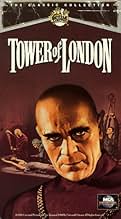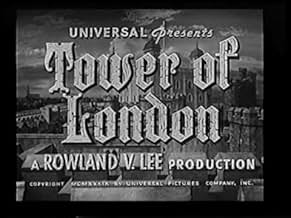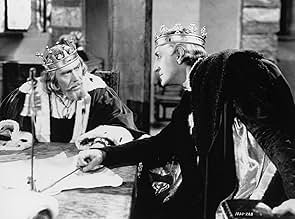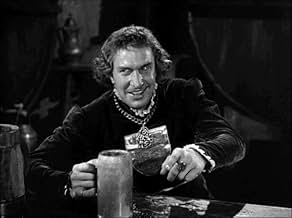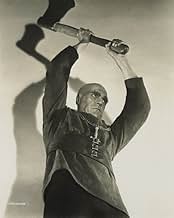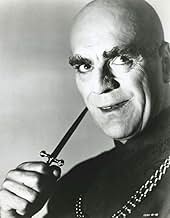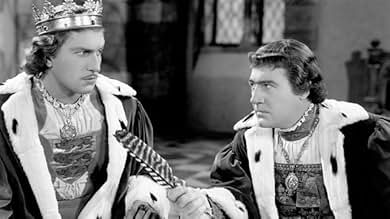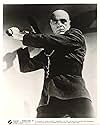AVALIAÇÃO DA IMDb
6,6/10
2,4 mil
SUA AVALIAÇÃO
Adicionar um enredo no seu idiomaIn the 15th century Richard Duke of Gloucester, aided by his club-footed executioner Mord, eliminates those ahead of him in succession to the throne, then occupied by his brother King Edward... Ler tudoIn the 15th century Richard Duke of Gloucester, aided by his club-footed executioner Mord, eliminates those ahead of him in succession to the throne, then occupied by his brother King Edward IV of England.In the 15th century Richard Duke of Gloucester, aided by his club-footed executioner Mord, eliminates those ahead of him in succession to the throne, then occupied by his brother King Edward IV of England.
- Prêmios
- 1 indicação no total
Avaliações em destaque
When one has seen the Shakespearean treatment of this story, it falls far short of the masterwork. That said, it isn't fair to compare a low budget period movie to Shakespeare. I think what I did like about it, though, is its visuality. I liked Karloff going through a day's work, putting one more weight on a guy they're suffocating, like a cook checking to see if there's enough salt in the soup. I really like Basil Rathbone. Of course the Sherlock Holmes movies are my favorites, but he is a consummate actor and rises above everyone else in the story. I was disappointed in the lack of character development other than Richard and the silly romantic subplot.
Karloff ,also, should have had his moment to confront Richard since he is a fictionalization anyway.
It was neat seeing Vincent Price begin his mugging, whining characterization of the ineffectual son of the king. I did like the drinking scene but wonder why no one else was there to observe the result. Richard (Rathbone) seemed to have an awfully easy row to hoe. I was also disappointed in the big battle scene at the end, but won't spoil it here.
All in all, I liked looking at this movie, but felt sort of empty at the conclusion. Also, where does it come off as a horror movie, other than the rather comical dungeon scenes?
Karloff ,also, should have had his moment to confront Richard since he is a fictionalization anyway.
It was neat seeing Vincent Price begin his mugging, whining characterization of the ineffectual son of the king. I did like the drinking scene but wonder why no one else was there to observe the result. Richard (Rathbone) seemed to have an awfully easy row to hoe. I was also disappointed in the big battle scene at the end, but won't spoil it here.
All in all, I liked looking at this movie, but felt sort of empty at the conclusion. Also, where does it come off as a horror movie, other than the rather comical dungeon scenes?
It's unfair to compare this horror movie of the pre-WW2 vintage to Richard III of the Bard. While the Tower of London builds on Shakespeare's vilification of Richard III, this tale is much more of a dark genre that was popular at that time and which continued up until after WW2. These are the days of Revenge of the Cat People, Frankenstein and its sequels and other films that strike the mood of those post depression times. The censors of the time forbade any explicit sex or violence and what you saw was always highly stylized. However, presenting a stylized horror film, mild, if not downright tame, by today's standards, required a great deal of subtlety from the actors, which is something sadly lacking in today's slice 'n dice menus. These new horror films are so predictable and rely on gore and explicit violence to provide the thrill which like pornography requires each new presentation to up the ante in mindless antics, each trying to out-gross the previous. So, what have we here in this fine old film. The classic tale of Richard Crook-back. We have the great Basil Rathbone as the Black Duke and Boris Karloff as his fictional sidekick, Mord. Yes, Karloff is nearly a stereotype for the evil henchmen who's willing to carry out the furious demands of his heartless master. But, there's a young Vinnie Price as the Duke of Clarence awaiting a drowning in a vat of Mumsey wine. The action line of this classic story moves quickly, the lines are spoken clearly and the the acting is superb. What else do you want from a 1939 horror drama?
From the confines of the gloomy TOWER OF London, Richard, the treacherous Duke of Gloucester, murders his way to the throne of England.
This lively & enjoyable pseudo-historical drama presents some surprisingly good performances which do much to elevate the film and make it quite enjoyable.
Basil Rathbone is excellent as Richard, leering & smirking, dangerous as a poisonous serpent, he takes what could be a rather hammy part and gives it a certain malevolent stature. Here was a villain able to charm, coddle or kill his own brothers with equal skill. Rathbone makes him quite believable. (Oddly, while carrying Richard's humpback, Rathbone ignores the King's withered left arm.)
Although this is not a horror film, Boris Karloff's Mord the Executioner is a very horrific character. Bald headed & club-footed, he stalks about the Tower carrying out Richard's foul orders. Karloff makes an indelible mark in his very first scene, inflicting more torments on the denizens of the torture chamber. With such a striking performance, as well as his status as one of Universal's most celebrated actors, it is strange that Karloff doesn't receive equal billing with Rathbone here.
Vincent Price does very well in the role of the nervous, jealous, doomed Duke of Clarence, holding up nicely to the over-the-top performances of Rathbone & Karloff. (It is fascinating to see this early teaming of the three frightmeisters; the next time they would all appear in the same film would be in 1963's THE COMEDY OF TERRORS.)
Special mention should be made of Ian Hunter as Edward IV. While acquiescing to all of Rathbone's bloody schemes, Hunter nonetheless injects an element of sardonic humor into the role, making it very entertaining.
Barbara O'Neil as stately Queen Elizabeth, Nan Grey as spunky Lady Alice & Rose Hobart as lovely Anne Neville each do good work in roles which demand little from any of the actresses.
The supporting cast is sprinkled with familiar faces - Leo G. Carroll, Miles Mander, Lionel Belmore, Ernest Cossart - each excellent in small roles. Far down the cast list is Ralph Forbes as Henry Tudor. This splendid actor was on the very cusp of becoming a major star at the end of the silent era; although gifted with a fine speaking voice, he was never able to achieve his full potential in talking films.
Movie mavens will recognize uncredited appearances by both Robert Greig as a friendly priest & Nigel de Brulier as the archbishop who marries little Edward V.
Universal gives the film a fine gloss, with good atmospherics. The exterior London scenes look impressive on the screen.
The film presupposes a certain amount of intelligent knowledge to already be in the hands of the audience. Indeed, a working acquaintance with the facts surrounding the Wars of the Roses & the English Line of Succession could only be of help to the viewer in unraveling the intricate plot.
TOWER OF London should be enjoyed as entertainment, not accepted as historical fact. Modern research is slowly overturning many of the old beliefs concerning Richard of Gloucester. As a result, he is emerging as a far less bloody individual and one who may have been pilloried for centuries by an unfriendly press. Shakespeare, it should be remembered, was writing for the Tudors - who may have had their own dark ancestral deeds to hide. Indeed, there is much creditable speculation that it was actually Henry Tudor who had the young Tower Princes murdered.
This lively & enjoyable pseudo-historical drama presents some surprisingly good performances which do much to elevate the film and make it quite enjoyable.
Basil Rathbone is excellent as Richard, leering & smirking, dangerous as a poisonous serpent, he takes what could be a rather hammy part and gives it a certain malevolent stature. Here was a villain able to charm, coddle or kill his own brothers with equal skill. Rathbone makes him quite believable. (Oddly, while carrying Richard's humpback, Rathbone ignores the King's withered left arm.)
Although this is not a horror film, Boris Karloff's Mord the Executioner is a very horrific character. Bald headed & club-footed, he stalks about the Tower carrying out Richard's foul orders. Karloff makes an indelible mark in his very first scene, inflicting more torments on the denizens of the torture chamber. With such a striking performance, as well as his status as one of Universal's most celebrated actors, it is strange that Karloff doesn't receive equal billing with Rathbone here.
Vincent Price does very well in the role of the nervous, jealous, doomed Duke of Clarence, holding up nicely to the over-the-top performances of Rathbone & Karloff. (It is fascinating to see this early teaming of the three frightmeisters; the next time they would all appear in the same film would be in 1963's THE COMEDY OF TERRORS.)
Special mention should be made of Ian Hunter as Edward IV. While acquiescing to all of Rathbone's bloody schemes, Hunter nonetheless injects an element of sardonic humor into the role, making it very entertaining.
Barbara O'Neil as stately Queen Elizabeth, Nan Grey as spunky Lady Alice & Rose Hobart as lovely Anne Neville each do good work in roles which demand little from any of the actresses.
The supporting cast is sprinkled with familiar faces - Leo G. Carroll, Miles Mander, Lionel Belmore, Ernest Cossart - each excellent in small roles. Far down the cast list is Ralph Forbes as Henry Tudor. This splendid actor was on the very cusp of becoming a major star at the end of the silent era; although gifted with a fine speaking voice, he was never able to achieve his full potential in talking films.
Movie mavens will recognize uncredited appearances by both Robert Greig as a friendly priest & Nigel de Brulier as the archbishop who marries little Edward V.
Universal gives the film a fine gloss, with good atmospherics. The exterior London scenes look impressive on the screen.
The film presupposes a certain amount of intelligent knowledge to already be in the hands of the audience. Indeed, a working acquaintance with the facts surrounding the Wars of the Roses & the English Line of Succession could only be of help to the viewer in unraveling the intricate plot.
TOWER OF London should be enjoyed as entertainment, not accepted as historical fact. Modern research is slowly overturning many of the old beliefs concerning Richard of Gloucester. As a result, he is emerging as a far less bloody individual and one who may have been pilloried for centuries by an unfriendly press. Shakespeare, it should be remembered, was writing for the Tudors - who may have had their own dark ancestral deeds to hide. Indeed, there is much creditable speculation that it was actually Henry Tudor who had the young Tower Princes murdered.
Ambitious, historical tale with lots of battles (fairly well done) and much power struggling, particularly of course by the hunchbacked Richard. The matters romantic slow things down enormously and although clearly striving for some measure of authenticity, there are just too many characters for the budget or script to be able to deal with as one might have liked. However, given the limited resources, a reasonable result is achieved, helped enormously by three excellent male leads. Basil Rathbone is very fine indeed and very convincing in the role of the scheming, Richard and none of the camp Price would bring to the role another time. A very young Vincent price is also most effective and it is great to see his crooked smile and fluttering eyelids already swinging into action. A bit too fey here perhaps but lets himself go in the infamous drinking scene. Incidental to the main story and probably originally added as a bit of light relief, Boris Karloff brings anything but. An appropriately towering performance and despite very few lines and not a lot of screen time he drags himself into centre frame and haunts one's memory afterwards.
Tower of London is as sinister as Basil Rathbone, Boris Karloff and the rest of Universal's horror department can make it. Although the picture is not without its weaknesses, lack of thrills is not one of them. Neither is the casting--Rathbone and Karloff are savage enough to please the most bloodthirsty. Karloff enjoys his role as executioner and spends plenty of time in his torture chamber.
Você sabia?
- CuriosidadesVincent Price later admitted the "wine" he got drunk with in the film was Coca Cola.
- Erros de gravação(at around 15 mins) A person can be seen walking past the window.
- ConexõesEdited into A Torre de Londres (1962)
Principais escolhas
Faça login para avaliar e ver a lista de recomendações personalizadas
- How long is Tower of London?Fornecido pela Alexa
Detalhes
- Data de lançamento
- País de origem
- Idiomas
- Também conhecido como
- Tower of London
- Locações de filme
- Empresa de produção
- Consulte mais créditos da empresa na IMDbPro
- Tempo de duração
- 1 h 32 min(92 min)
- Cor
- Proporção
- 1.37 : 1
Contribua para esta página
Sugerir uma alteração ou adicionar conteúdo ausente

